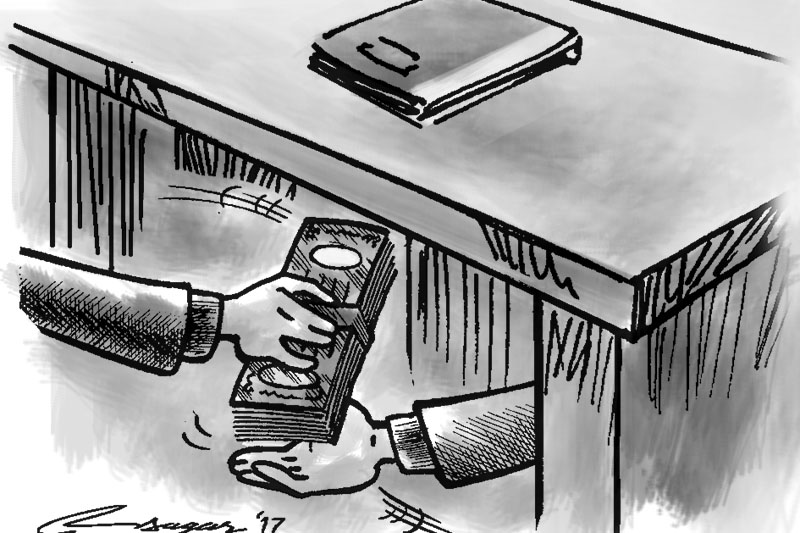Practice of corruption: Hindrance to nation-building
Nepal can only prosper if it rids itself of the scourge of corruption, bribery, favoritism and foul political power games. Only then can we hope for a Nepal where development, rule of law, respect for human rights, peace and prosperity are the order of the day
During his successful reign and his memorable feat in establishing the identity of modern Nepal, King Prithvi Narayan Shah, the great unifier, rightly stated: ‘Both bribe takers and givers are the worst enemies of the nation.’
This statement quoted more than two centuries ago is valid even to date and it goes to show that corruption has never been a new or unique phenomenon from which our ancestors remained untouched. Corruption has always been a great hindrance to nation building and in so doing it has been revealing the gray side of id-driven wicked intentions of mankind.
There is no doubt that Nepal has been weaving its path to modernization and a transformed form of federal democratic republic and it has promulgated the new constitution of 2072.
Yet, the people in power don’t seem to have been much affected and these dishonest behaviors are prominent. This tendency is easily reflected by the people’s lack of trust in the leaders and the nation builders and their resistance to the ever-in-flux government’s claims to establish good governance, implement rule of law, to bring about economic development, peace and prosperity.
In addition, the subsequent governments’ “zero tolerance policy on corruption” has brought no substantial change and the zero tolerance has melted to zero. So what has been causing us to overlook or otherwise allow such a sensitive issue to grow without brake?
The most obvious answer to this question is that our country is severely suffering from the negative consequences of illiteracy, unemployment and poverty so that commoners have much more important issues to worry about than this.
So then, corruption gets heavily ignored and in time people get used to it merely using this issue as an ice-breaker or for party discussion. What most people don’t realize is that most of their problems often find their root to corruption. Much less do they realize that had our leaders desisted from corruption and used the country’s resources systematically and judiciously, half the current problems wouldn’t even exist.
It is also necessary to understand that corruption is a two-way street when it comes to bribe giving and bribe taking.
The state is responsible to provide fundamental needs to their people while it is the civil duty of the people to pay their taxes - not with the feeling of burden but with the feeling of pride that they are directly contributing to the nation building process.
If the series of corruption continues in this manner, there are chances that the international donor community will steadily stop the grants and other donations directly affecting the national economy. Nepal already has big foreign debts and cases of the donor nations withdrawing their money due to irregular and transparency-less spending is not rare.
Even with debt forgiveness trend in wealthier nations, Nepal depends heavily upon the goodwill of other nations. Due to the lack of will power and corruption of politicians and bureaucrats, the investment climate has declined in Nepal.
It is not strange that when any new foreign investor tries to apply for approval to start their business in Nepal, they are compelled to wait for more than a year even when the firm is technically, socially, economically and environmentally feasible .
Without bribing the table-workers their files are not even looked at. In spite of helping and providing tax exemption and other facilities, some of bureaucratic officials try to take bribes discouraging foreign investments. The politicians have strengthened their positions by weakening the administration.
Nowadays administrators have nothing to do except to receive orders. Hardly any of them are seen to take a stand to uphold the law if this goes against their master’s wishes. The Commissions for the Investigation of Abuse of Authority (CIAA) is the constitutional body that is responsible for tracking down government related corruption but it has lost most of its cases filed in courts. This clearly shows the ineffectiveness of CIAA and its leadership.
CIAA is not playing independently but has been seen to take actions on the basis of pre-conceived and personal grudges.
There are solutions to problems even as dire as corruption. Further, there are also precautionary measures to free ourselves and the entire nation and the new generation from the growing chain of corruption.
These solutions lie in the very basic conditions such as effective monitoring, vetting or cross-checking suspected cases of corruption, social boycott against corrupt people, transparency, accountability and good governance, reforming the budget process, strict laws and their implementation, education and awareness of the people, playing effective roles by civil society and empowerment of corruption controlling agencies like the CIAA , and effective coordination and cooperation among all the stakeholder are a few things that can help reduce corruption.
A weak governance system, the absence of the rule of law, low respect for human rights, mass poverty, centralized power and monopoly, lack of reward and punishment, deep rooted network of corruption, low salary and remuneration, and political apathy are some of the major causes of corruption.
Nepal can only prosper if it rids itself of the scourge of corruption, bribery, favoritism and foul political power games. Only then can we hope for a Nepal where development, rule of law, respect for human rights, peace and prosperity are the order of the day.






